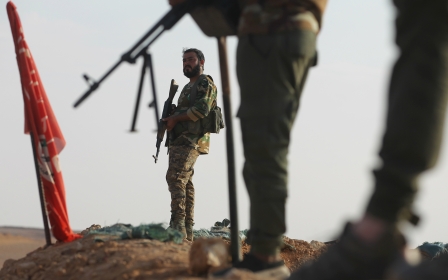Iranian press review: Tehran-Moscow vaccine collaboration in trouble

Russia vaccine collaboration fails
The collaboration between Tehran and Moscow to launch a Sputnik-V vaccine production line in Iran cannot be counted on to provide a local supply of doses, say Iranian officials.
According to the officials, Russia has also not delivered the vaccine doses it promised to Iran.
In April, Iran announced that Tehran and Moscow would jointly produce the Sputnik-V vaccine to contain the coronavirus pandemic in the Middle Eastern country.
Stay informed with MEE's newsletters
Sign up to get the latest alerts, insights and analysis, starting with Turkey Unpacked
However, on Saturday Alireza Raisi, a spokesman for Iran's National Coronavirus Combat Taskforce, announced that Iran could not count on the production line that Russia sent to Iran because "it was good for nothing".
Speaking in a Clubhouse chatroom, Raisi said that production of the Russian vaccine in Iran would begin in September, but that Iran could not use the output since Russia had signed contracts with other countries to sell the vaccine.
"This production line is in Iran, but for sure its product does not belong to Iran and [Russia] can distribute it in other places based on the contracts it has. So that's why we don't count on this production line for the vaccines we need for the national vaccination," he added.
Turkey's Afghan role arouses suspicion
Iranian officials have expressed concern over Turkey's decision to take over security at Kabul's Hamid Karzai International Airport after the withdrawal of US and Nato forces.
Since 2013, Turkey has deployed its forces at the airport in the Afghan capital alongside US and Nato forces, but according to a new agreement with the Afghan government, Turkey will be the only country responsible for airport security when all western troops leave Afghanistan.
In response to Turkey, the Taliban urged Ankara to withdraw its forces from Afghanistan, warning that Taliban fighters would fight any foreign troops.
Officials in Tehran have not commented on the move by Turkey. However, outlets close to the Iranian government are wary of Turkey's new role in Afghanistan.
The Jamaran website dubbed Ankara's decision to keep its forces in Afghanistan "Turkey's big gamble", suggesting that Turkish President Recep Tayyip Erdogan was seeking more influence in Afghanistan in order to "make his dream of a new Ottoman Empire come true".
The Tasnim news agency wrote that Turkey's attempt to have a more substantial presence in Afghanistan was part of a policy to exert pressure on Iran as its leading regional rival.
Afghanistan and Iran have longstanding historical ties and influences, sharing the same language, as well as cultural and religious similarities.
Pandemic death toll rises
The daily death toll from Covid-19 began to sharply rise in mid-July as the fifth wave of the pandemic swept across Iran, and oxygen shortages hit disadvantaged provinces such as Sistan and Baluchestan in the country's southeast.
The situation in another eastern province, Golestan, is also reported to be critical.
On Monday, in a speech to parliament, Gholam Ali Kouhsari, a legislator from Golestan, condemned the government's handling of the pandemic, saying that Covid-19 patients were lying on hospital floors in his province due to bed shortages.
According to local media, hospitals in Tehran also ran out of beds for Covid-19 patients. Alireza Zali, head of the Tehran Coronavirus Combat Taskforce, warned that the capital had become a hotspot, spreading the Delta variant of coronavirus to other parts of the country.
"The real situation in Tehran is so dangerous that we don't even need to exaggerate it [to warn the people]," Zali was quoted by the Arman-e Emrooz daily as saying. He added that Tehran had set a new record for the number of people hospitalised for Covid-19 on a single day. On Monday, over 9,700 were admitted to Covid-19 wards in the Iranian capital.
Tehran was on a week-long lockdown from July 20. However, law enforcement did not implement the restrictions and shops, restaurants, and all non-governmental offices and businesses remained open in the capital.
'Khuzestan does not need mineral water'
Following a severe water shortage in Iran's Khuzestan province that led to widespread protests, a group of activists began collecting money to buy mineral water for the people of the area. However, the bid backfired, with Iranian social media users criticising the scheme for being naive.
Responding to the call, some Twitter users shared a poster saying: "Khuzestan does not need mineral water. The problem is not mineral water. The problems are outdated infrastructure, incompetent officials, and not giving the province its share of water."
Iran's largest river, the Karun, passes through Khuzestan. Water exploitation in northern provinces has caused the current crisis, leaving farmers in Khuzestan in a dire situation.
The semi-official news agency ISNA criticised the activists' move, writing: "Which plain or farmland could be watered with this mineral water? Which livestock's water requirements would be met with that?"
Some Iranians also took the chance to make fun of social media influencers and activists.
"To those friends who are trending the mineral water hashtag for Khuzestan: would you please also trend a hashtag for AA batteries to solve the electricity shortage problem?" wrote one Iranian Twitter user.
* Iranian press review is a digest of reports that are not independently verified as accurate by Middle East Eye.
Middle East Eye delivers independent and unrivalled coverage and analysis of the Middle East, North Africa and beyond. To learn more about republishing this content and the associated fees, please fill out this form. More about MEE can be found here.






